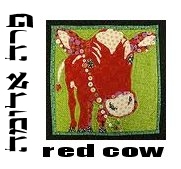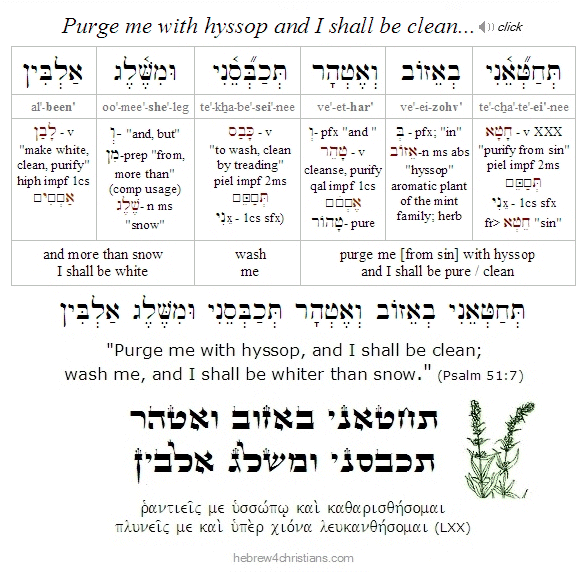|
Our Torah portion this week (i.e., Chukat) describes the sacrifice of parah adumah (פרה אדומה), or the "Red Heifer" (see Num. 19:1-10). The Red Heifer is considered paradoxical to most Jewish thinkers, since the one who offers this sacrifice becomes ritually impure, while the sprinkling of the ashes from it makes people clean... The ritual is considered chok (חק) within Jewish tradition, meaning that it makes no rational sense. The Talmud states that of all the 613 commandments given in the Torah, even King Solomon with all his wisdom could not fathom this decree. However, the sacrifice of Yeshua the Messiah can be understood as the fulfillment of the symbolism of the Red Heifer: Both were entirely rare and without defect (sin); both were sacrificed "outside the camp"; both made the one who offered the sacrifice unclean but made the one who was sprinkled by it clean; and finally, both sacrifices cleanse people for priestly service.
The Red Heifer had to be a perfect specimen (temimah) that was completely red, "without blemish, in which there is no defect (mum)." The rabbis interpreted "without blemish" as referring to the color, that is, without having so much as a single white or black hair. This is the only sacrifice in the Torah where the color of the animal is explicitly required. Moreover, the Red Heifer was never to have had a yoke upon it, meaning that it must never have been used for any profane purposes.
Unlike all other sacrifices offered at the altar, the red heifer was taken outside the camp and there slaughtered before the priest, who then took some of its blood and sprinkled it seven times before the Mishkan (thereby designating it as a purification offering). [During the Second Temple period, the High Priest performed this ceremony facing the Temple while atop the Mount of Olives.] Then the red heifer would be burned in its entirety: its hide, flesh, blood, and even dung were to be burned (unlike other Levitical korbanot). Do not miss this: unlike all other animal sacrifices, all the blood of the offering was to be burned in the fire.
Hyssop, scarlet yarn, and a cedar stick would then be thrown upon the burning Red Heifer (these same items were used to cleanse from tzara'at, skin disease). In other words, the blood was assimilated into the ashes of the sacrifice, which were then gathered and mixed with water to create the "water of separation" (mei niddah) for the Israelite community. Note that the word "separation" (niddah) refers to menstrual impurity and hearkens to Zech. 13:1: "On that day there shall be a fountain opened for the house of David and the inhabitants of Jerusalem, to cleanse them from sin and from niddah."
Anyone (or anything) that came into contact with a corpse (the embodiment of sin and death) was required to be purified from tumah by means of the mei niddah. The purification procedure took seven days, using stalks of hyssop dipped into the water and shaken over the ritually defiled person on the third day and then again on the seventh day. After the second sprinkling, the person undergoing the purification process would be immersed in a mikvah (pool of running water) and then be unclean until the following evening.
According to Jewish tradition, the red heifer sacrifice was to atone for the sin of the Golden Calf, though the Torah itself does not make this association. The LORD Yeshua, our High Priest of the New Covenant, is the perfect fulfillment of the Red Heifer, since he was completely without sin or defect (2 Cor 5:21; John 8:46); he was sacrificed outside the camp (Heb 13:13); he made himself sin for us (2 Cor 5:21); his sprinkling makes us clean (1 Pet 1:2; Heb 12:24; Rev 1:5); and the "water of separation" that his sacrifice created is the means by which we are made clean from the impurity of sin (Eph 5:25-6; Heb 10:22).
As mentioned above, Torah commandments (mitzvot) that defy reason are called "chok" (חק). The Jewish sages tend to focus on the Red Heifer as the "mother of all mystery mitzvas," but surely we must go back to the Akedah - that is, to the sacrifice of Isaac at the hand of his father Abraham - as the greatest of God's decrees that defy human reason. The willingness of both Abraham and Isaac to obey - despite their inability to understand - was a direct result of their unwavering faith in God's love and promises. Likewise the heart of our faith says simply: "Jesus saves." His sacrifice saves us from sin and death, yet this also is "chok" - a matter of faith... We may seek logical reasons or explanations, but ultimately it is a matter of divine mystery, just as the darkness covered the earth while the Savior suffered for us on the cross at Calvary (Mark 15:22). "Jesus saves" is the mystery of our confession (Rom. 10:9-10). We are cleansed by our contact with sin and death through him, just as he bears our sin and defilement on our behalf. as it is written: "God made the One who did not know sin to be sin for us, so that in him we would become the righteousness of God" (2 Cor. 5:21).
"But when Messiah appeared as a High Priest (כּהֵן גָּדוֹל) of the good things that have come, then through the greater and more perfect tent (not made with hands, that is, not of this creation) he alone entered once for all into the Holy Places, not by means of the blood of goats and calves but by means of his own blood, thus securing an eternal redemption (גְּאוּלַּת עוֹלָם). For if the blood of goats and bulls, and the sprinkling of defiled persons with the ashes of a heifer (אֵפֶר הַפָּרָה), sanctify for the purification of the flesh, how much more will the blood of Messiah (דַּם הַמָּשִׁיחַ), who through the eternal Spirit (בְּרוּחַ עוֹלָם) offered himself without blemish to God, purify our conscience from dead works to serve the living God (אֱלהִים חַיִּים)?" – Heb. 9:11-14
The Torah of the new covenant is inner, deeper, and eternal, whereas the Torah of the older covenant is outer, limited, and subject to obsolescence (Heb. 7:12; 8:13). The older covenant foretold of the coming Substance by means of the "ashes that purify the impure yet make the pure, impure." Only after we have been "sprinkled with the ashes" are we made clean from death; only when we make contact with the "ashes of Yeshua" offered on our behalf are we cleansed from sin and death (1 Pet. 1:2; Heb. 10:22).
Hebrew Lesson
Psalm 51:7 reading (click):
Related Topics:
Podcast:
|



